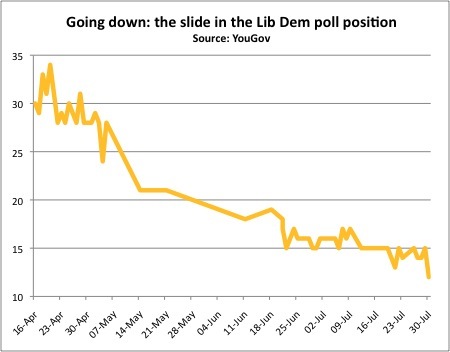
Yesterday, a “source close to the Prime Minister” told the Telegraph that we shouldn’t bother much with the opinion polls as at the moment. As they put it, “we’re only a few weeks into a new Parliament and we’ve got nearly five years to go before everyone really has to worry about the polls again.” But, make no mistake, there will be Lib Dems who are deeply concerned by how their party is polling at the moment. The YouGov poll in today’s Sunday Times, which has the yellow bird of liberty stuttering along at 12 percent, only underlines a remarkable decline since the election campaign (see chart above).
The pressure on David Cameron to make further concessions to the Lib Dems will be enormous, not least because the that party’s backbenchers are more likely – and more able – to split the coalition than their Tory counterparts. In this regard, Cameron is a victim of the similarities between the two parties before the coalition was formed. There was so much overlap, on everything from civil liberties to the public finances, that both sides are now getting a decent approximation of the government they promised in their manifestos. All that is left is a series of totemic, individual policies – capital gains, voting reform, etc. – that the coalition has to work through like a checklist; deciding whom to keep happy, and when.
As Tim Montgomerie points out over at ConservativeHome, the latest one of these seems to be Trident. The Lib Dems want its expensive renewal scrapped, but many Tories regard it as intrinsic to our national defence. Should this be an area where Cameron tries to make a concession to his coalition partners? I’d say so. But Cameron would be well advised to spend part of the summer in conversation with his own backbenchers, working out when and where they would be prepared to give ground on Trident and on other issues. If this coalition is to last, then it needs to be in permanent internal debate.






Comments